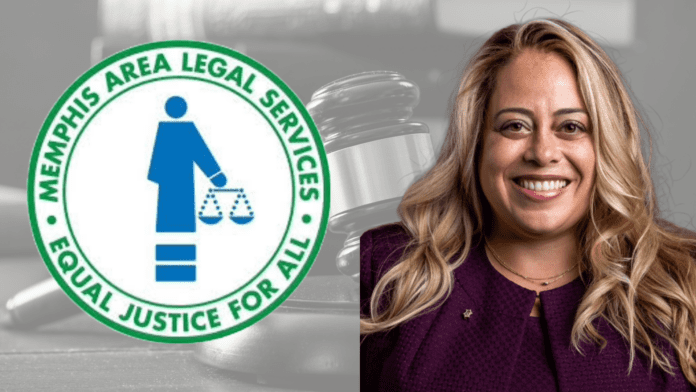Although a new leader was recently appointed to direct the operations for Memphis Area Legal Services, the nonprofit’s mission won’t steer from the course plotted through its 55-year history.
“We operate pretty much like a typical law firm,” said Nicole Grida, the new CEO of Memphis Area Legal Services. “If you have a legal problem, you can come to us. We will make a determination, as to whether you meet our income requirements.”
However, the legal issue must fall within the scope of MALS’ priorities.
In addition to consumer and individual rights, the legal organization provides legal assistance with family and children-related issues, housing and real property, income maintenance, health and senior issues.
The nonprofit has lawyers, paralegals and other legal professionals on staff. There are also several local attorneys that donate their services to clients in low-income areas of Shelby, Fayette, Tipton and Lauderdale counties.
“We couldn’t serve as many clients as we do without the support of the private bar,” said Grida.
While Grida’s title is new – she took the job on June 1 – her familiarity with Memphis’ legal community isn’t.
“My involvement with the legal community has equipped me with a number of skills to take this role and use the experience I have in those spaces to make an immediate impact…Most of our clients are from an under-represented group.”
This includes women. In 2022, the demographic made up 80% of MALS’ client list.
After earning her degree at the University of Tennessee College of Law in 2006, Grida spent the next 18 years as a civil litigator defending both individuals and companies, over matters ranging from product liability and toxic tort to catastrophic personal injury.
“Being a longtime member of the Memphis legal community has enabled me to do things, like be a longtime volunteer and supporter of Memphis Area Legal Services. It’s allowed me to serve on a number of different committees,” said Grida.
Among those is the Access to Justice Committee, as a part of the Memphis Bar Association. Grida was also a board member of the Tennessee Alliance for Legal Services, along with other council, committees and working groups focused on access to justice.
Her breadth of experience has helped her grab the reigns of an organization in flux.
In April, Memphis Areal Legal Services lost its chief source of funding – $1.7 million – after a congressionally-financed nonprofit concluded “MALS has not shown an ability to improve program operations.”
In a letter, Legal Services Corporation President Ron Flagg also said “MALS failed to engage in best practices for effectively and efficiently providing civil legal services under the grant.”
The yardstick for approval includes the American Bar Association’s standards.
In the six-weeks since Grida replaced the interim CEO, retired Shelby County Session Court Judge Royce Lambert, she has worked to stabilize the organization. In addition to upping the closure rate, regaining fundraising is another must. Other cities – like Detroit, for example – have lost LSC funding, only to regain it after results improved.
“We did make sure to get an application in to secure that funding for 2025. We’ll hear later this year whether we were successful…,” said Grida. “I’ve also been exploring additional funding, as well as stabilizing the other grants we currently have.”
Stabilization also requires a hard look at internal policies, processes, procedures to use grant and donor dollars efficiently. To gain further insight into “best practices,” Grida is collaborating with local partners, state-wide organizations and other legal aid firms to learn from their operations.”
“I’m also identifying ways to provide additional training to my team…so that we can collaborate with other legal aid attorneys, increase our leveraging of technology, and just otherwise becoming a more efficient legal aid law firm.”
Typically, another requirement to meet the needs of the underserved is outreach, which is achieved through speaking engagements at community centers and hosting free legal advice clinics. The Benjamin L. Hooks Central Library at 3030 Poplar Ave. hosts a clinic the second Saturday of every month.
“We meet with clients. We also collaborate with the local private bar to make sure we get some volunteer attorneys, or some of my staff attorneys. It’s just a limited legal advice clinic. People can come in with their legal issue and we sit down and try to provide them with some guidance.
The next clinic is scheduled for Aug. 10.
There are also specialty clinics focused on a variety of topics, like consumer rights or domestic violence. Clinics are also held in MALS’ rural service area.
To learn more, visit https://malsi.org/, or call (901) 523-8822.


